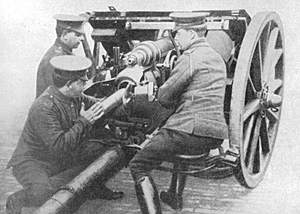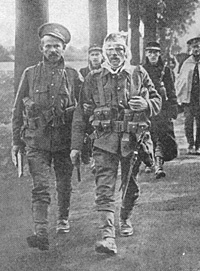WHAT DID IT ACHIEVE?
 Von Muck had been searching for the left flank of the BEF and had found it. The defense put up by the scratch force at Elouges convinced him that he had not found the flank after all, but was engaging part of the main line. His attack was therefore totally overwhelming for the defenders. His objective of pushing the British steadily back onto the rest of the army was foiled by the tenacity of the defense. Being besieged in Maubeuge had been one of the options considered by Sir John French, but drawing on lessons from the Franco-Prussian War, he had decided against this. The ferocity of the battle at Elouges held Von Muck's attention for an entire vital day and enabled the BEF to escape.
Von Muck had been searching for the left flank of the BEF and had found it. The defense put up by the scratch force at Elouges convinced him that he had not found the flank after all, but was engaging part of the main line. His attack was therefore totally overwhelming for the defenders. His objective of pushing the British steadily back onto the rest of the army was foiled by the tenacity of the defense. Being besieged in Maubeuge had been one of the options considered by Sir John French, but drawing on lessons from the Franco-Prussian War, he had decided against this. The ferocity of the battle at Elouges held Von Muck's attention for an entire vital day and enabled the BEF to escape.
Foiled in his intentions and with information scarce, Von Muck ordered his II Cavalry Corps to locate the new British flank. He needed to know the British line of retreat urgently so he could resume his attempts to outflank them. However, in view of the mauling IV Corps had received, II Cavalry Corps delayed until they could call up additional artillery support. In doing so, they lost the chance to catch the British drawn out on the roads to Le Cateau, in which situation the exhausted and disorganized infantry would have had little hope of effective resistance. By the time they did advance, the moment was all but past and the caution with which they probed forward gave the BEF even more time. Realizing the gravity of the situation at Elouges, Sir John French ordered the withdrawing troops to mostly use roads east of the extensive Mormal Wood. This placed more distance between the searching Uhlans and the retreating British.
Although the German official history speaks of the day of Elouges as one of pursuing a beaten enemy, the facts show a different story. IV Corps started three miles away from the Mons-Valenciennes highway and camped for the night on the slope between Audregnies and Elouges. After contact, they had advanced only one extra mile. By midnight, the British had fallen back to a position eight miles further away, without being pursued. IV Corps did not resume its advance until the following day.
WHAT COULD IT HAVE ACHIEVED?
Von Muck was in a position to have used much of his First Army to turn the British and not only cut them off, but also most of the French and Belgian forces then desperately trying to hold the German advance. Had IV Corps been able to brush aside the defenders of Elouges he would have found that the British had nothing else in reserve with which to have countered him. Indeed, had IV Corps and First Army followed up the retreating British flank they could stopped them from adopting new positions and renewed the battle from a situation of advantage. This would almost certainly have meant the collapse of the British flank and there was now too little left to hold an entire Corps for another day. Ammunition was running low and most of the artillery had in fact expended their last remaining rounds.
Had he pushed on, instead of allowing IV Corps to rest for the night, Von Muck would have found the roads ahead of him filled with battered and retreating forces, drawn out along the roads to Le Cateau. In such circumstances, resistance would have been very difficult. If his II Cavalry Corps had moved quickly and aggressively, they would have interrupted even the advance down the eastern side of Mormal Wood. When the German Uhlans reached this obstacle they found numerous paths made it easy to pass through and it provided little of the flank protection Sir John French had hoped it would. An aggressive flank move and rapid march by II Cavalry Corps might have even resulted in the capture of the British GHQ and Sir John French himself.
In all fairness, Von Kluck was only able to act on the information available to him. It was only three days since contact with the British had been made, prior to which they were thought to be closer to the coast. He does not seem to have enjoyed accurate information on the movement or strength of the BEF. If this had been available to him there is no doubt he would have acted accordingly. It could be argued in his defense that his reconnaissance forces let him down badly.
The loss of the BEF would have been devastating to the British. It represented almost the entire land force available, as it would take many months for other troops to be raised and trained. Such a loss might have caused the British government to seek a political solution, which would have been a triumph for Germany. It had been a near run thing. With his air group ordered to retreat to Le Cateau, Shephard might well have not taken his Avro into the air that morning. Having found the First Army he could have failed to find his unit on the road, or fallen to random ground fire. If his information had arrived only 30 minutes later, Fergusson would have also been on the road and unable to act on it. At the same time, the 2nd Cavalry Brigade would have been entangled in the main road traffic and unable to return as quickly as they did. The "what ifs" could go on and on, but it is clear that on that fine morning in August 1914, luck was with the British.
 WHAT DID THE GERMANS LEARN?
WHAT DID THE GERMANS LEARN?
German infantry continued to use mass attacks despite having already suffered serious casualties at the hands of the poorly trained Belgian Army. In the face of British Regulars with their "mad minute" of rapid fire, it was suicide. It could be therefore argued that the Germans, badly mauled by a tiny force, learnt nothing at all from it at tactical level.
At the strategic level, they also seem to have learnt little. Von Kluck continued to press on with all the speed and dash the Schlieffen Plan (Germany's strategic plan for a rapid defeat of France while holding Russia at bay) had called for, but his efforts at reconnaissance were lacking. He continually issued orders with an unclear picture of his enemy. This would culminate in the disaster before Paris, when, being still not fully acquainted with the dispositions of his opponents, he turned his flank toward them and created a disastrous situation that effectively ended the first phase of WW1.
WHAT DID THE BRITISH LEARN?
It could be argued that the British learnt little more than the Germans. Their infantry tactics were superior and their firepower quite incredible. However, they continued to yearn for the "open battle" and to seek cavalry engagements rather than take advantage of their firepower. The troops carried few entrenching tools and were therefore unable to effectively dig in when faced by massed German artillery and machineguns. This meant that although they returned fire with deadly effect, their own casualties continued to mount until the BEF had virtually melted away. They fought bravely and they fought with great skill, but overall their senior commanders did not show much understanding of war against a well-equipped and motivated opponent.
For the rank and file who took part and survived to read the memoirs of their superiors, the lesson learned was probably that their efforts were greatly under appreciated. Most accounts describe their magnificent fight at Elouges as "the flank action", without even giving it the courtesy of being called a "battle". While considered a "plucky fight against the odds" most of the histories and memoirs are more concerned with the main "Battle of Mons". Yet, for those who saved an army, their efforts were no less heroic than those of Rorkes Drift, where at least the Zulu did not have artillery and machineguns. Their efforts were no less heroic than the "Charge of the Light Brigade" and at least far more productive. They may not have won a war, as their forefathers had on the nearby field of Waterloo, but they enabled Great Britain to continue with one. Although fought near the field of Malpaquet, among the coming generations of military historians their efforts were to be less well known than that earlier Malburian episode.
It is a shame that so few people have heard their story. Faced with odds of 24:1 they were asked to give the BEF a vital breathing space. They fought against the odds and succeeded.
SELECT BIBLIOGRAPHY
The Mons Star. David Ascoli. Harrap London. 1981.
Alarms And Excursions. Maj.General Sir Tom Bridges. Longmans & Green 1938.
Military Operations. Brigadier Gen.Sir J.E.Edmonds. Macmillan. 1923.
The First Forty Days In 1914. Lt.Gen. Sir Horace Robertson KBE. DSO. AMF. 1950.
Forty Days In 1914. Maj. Gen. Sir. F. Maurice. Constable. 1921.
1914 The Days Of Hope. Lyn Macdonald. Michael Joseph. 1987.
The Guns Of August. Barbara W. Tuchman Ballentine 1962.
VCs Of The First World War. Gerald Gliddon. Allan Sutton. 1994.
Papers. Burgoyne. IWM.
Battle of Elouges August 24th 1914
Back to Table of Contents -- Against the Odds vol. 2 no. 2
Back to Against the Odds List of Issues
Back to MagWeb Magazine List
© Copyright 2003 by LPS.
This article appears in MagWeb.com (Magazine Web) on the Internet World Wide Web.
Other articles from military history and related magazines are available at http://www.magweb.com
* Buy this back issue or subscribe to Against the Odds direct from LPS.
